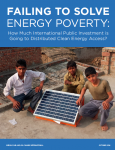The Sierra Club and Oil Change International have released a report highlighting the failure of multilateral development banks (MDBs) to align energy lending with the International Energy Agency's (IEA) projections for ending energy poverty.
 October 2014: The Sierra Club and Oil Change International have released a report highlighting shortcomings in the multilateral development banks’ (MDBs) efforts to align energy lending with the International Energy Agency’s (IEA) projections for ending energy poverty.
October 2014: The Sierra Club and Oil Change International have released a report highlighting shortcomings in the multilateral development banks’ (MDBs) efforts to align energy lending with the International Energy Agency’s (IEA) projections for ending energy poverty.
The report, titled ‘Failing to Solve Energy Poverty: How Much International Public Investment is Going to Distributed Clean Energy Access?,’ finds that fewer than 10% of MDB energy investments target poor populations, which make up 40% of the world’s population.
The report evaluates the lending of a number of institutions, including the World Bank, Inter-American Development Bank (IDB), Asian Development Bank (ADB) and African Development Bank (AfDB), using standards based on projections from the IEA’s ‘Energy for All Case,’ which aims to achieve global energy access by 2030, with the majority of new investment going toward off-grid and mini-grid solutions.
By contrast, only one-quarter of the 10% of energy investments that targeted poor populations went towards off-grid or mini-grid clean energy deployment. Each bank had a clean energy access “scorecard” based on these findings and each received a failing grade.
While the World Bank supports such programmes as the UN Sustainable Energy for All (SE4ALL) initiative and cites poverty eradication as an overarching priority, Peter Bosshard, International Rivers, points out that “internal Bank incentives work against [efficiency] projects because they are often small in scale, demanding of staff time and preparation funds, and require long-term client engagement, making them less attractive.”
According to the authors of the report, the World Bank could develop new funds, alter staff incentives and create mandates to lend in clean energy markets, the benefits of which would be huge. The World Bank’s own Lighting Africa programme finds these markets are growing at a 95% annual rate. Private investors and foundations are beginning to take advantage of the opportunities offered by these markets, with US$45 million invested in 2014 alone.
The Sierra Club works to safeguard the health of communities, protect wildlife and preserve our wild places through grassroots activism, public education, lobbying and litigation. Oil Change International is a research, communications and advocacy organization focused on exposing the true costs of fossil fuels and facilitating the transition towards clean energy. [Sierra Club Press Release] [Sierra Club Blog] [Publication: Failing to Solve Energy Poverty: How Much International Public Investment is Going to Distributed Clean Energy Access?]